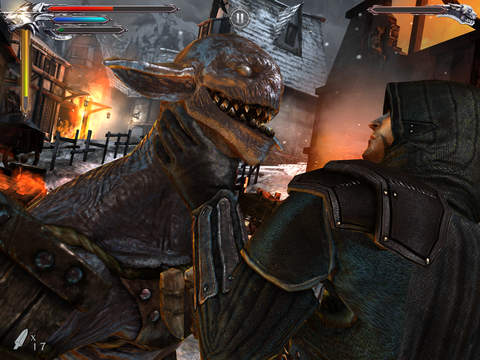Joe Dever's Lone Wolf Review

PROS
- Attempts to shake up some of the more lacklustre elements of the gamebook genre.
- The animated art and orchestral score make for an immersive experience.
CONS
- The quick time events are a pain.
- Health is too easily lost, and checkpointing is harsh.
VERDICT
Though gamebook fans will appreciate the attempt to inject some life into the genre, Lone Wolf's ambitious but undercooked combat system proves more of an obstruction than an asset.
- Full Review
- App Store Info
Gamebooks may be a niche market, but it is amazing how many people have fond memories of them. Relying on people's nostalgia for the '80s has worked for many gamebook publishers, and now Joe Dever, author of the infamous Lone Wolf series has thrown his hat into the fray with a new four part saga. With the release of Steve Jackson's excellent Sorcery! earlier this year, however, Lone Wolf has its work cut out for it. It's an interesting take on the genre, but one which creates as many problems as it solves.
You start your adventure by picking your character's traits and abilities Every time there is a choice to be made in the story, a seal will appear, taking you to a separate page where three optins await you. Usually, one or two of these choices will be greyed out. The choices available will depend on which attributes you selected for your character. Do you approach problems with caution, or are you the kick-down-the-door type? Do you have psychic powers, or enhanced strength? All roads lead to Rome, as they say, and there is no wrong answer.
The character sheet is available at all times, allowing you to access your inventory, journal, and skills. These screens are cluttered and a little obtuse, so we spent as little time in menus as possible.
Beyond the storytelling and decision making, the actual meat of the game is the combat. Like Sorcery!, Lone Wolf does its best to make combat more interesting than rolling a few animated dice. Unlike Sorcery!, though, the Lone Wolf team has attempted to integrate a full 3D combat system into the game, featuring magic, melee, ranged, attacks. Potions are also available to you to heal your wounds or boost your stamina. Stamina recharges over time, but is also crucial for parrying and negating incoming attacks.
Most attacks are linked to a quick time event that either has you tapping in time to onscreen prompts, swiping in a particular direction, or mashing the screen to build up energy. While most of the systems work, these QTEs demand a lot of precision. As any fault will instantly negate your attack or defence, combat quickly becomes a pain. And, since combat how you spend most of your time outside of the narrative, the irritation you feel begins to sour the experience.
Those who love their gamebooks or enjoy a good fantasy yarn will likely be able to look past the combat issues, and will enjoy the story on its own terms. Everyone else will probably find the annoying quick time event a deal breaker.














 FREE
FREE













